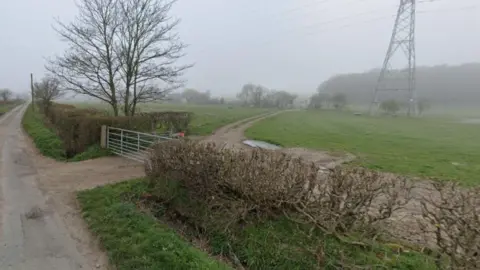Battery energy storage site plans approved
 Google
GoogleA new battery energy storage site planned for farmland has been given the green light.
South Staffordshire Council, which has refused permission for other battery energy storage systems (BESS), approved the application for land off Hobble End Lane south of Great Wyrley.
The system is set to be in place for about 40 years on a 3.1 hectare site and will be connected to an existing pylon, but the project does not currently have a connection date.
Great Wyrley Parish Council raised objections to the proposals. But planning officers at the district council concluded benefits outweighed any harm to the green belt.
They recommended the application for approval and plans were given the go-ahead at a planning committee meeting on Tuesday.
The parish council said the development would have a detrimental effect on a locally-listed asset, Silver Wedding Wood, which was planted in 1889.
Councillor Christopher Steel, who abstained from voting on the application, raised concerns about lorries having to go on to the opposite side of a road during the site construction process.
But the highways authority raised no objections to the application, subject to conditions, a report to the committee said.
'High demand'
Meanwhile, two BESSs are set to be installed in an industrial area of south Staffordshire.
The 200kW "battery box" systems were approved for land at Station Road and Latherford Lane on the Four Ashes Enterprise Centre near Wolverhampton.
The pair are far smaller than the BESS permitted for the site south of Great Wyrley.
A report to the planning committee said: "The facilities would provide a means of allowing electricity from the grid to be imported and stored within the batteries at times of low demand or when there are high levels of renewable energy available, and exporting it back to the grid during periods of high demand.
"Each Battery Box connects directly to the local electricity network, from which it can import or export electricity."
This news was gathered by the Local Democracy Reporting Service which covers councils and other public service organisations.
Follow BBC Stoke & Staffordshire on BBC Sounds, Facebook, X and Instagram.
